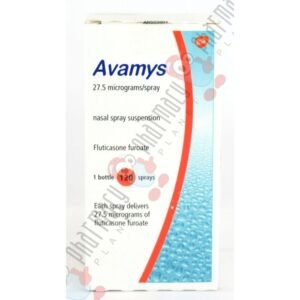What is Neoclarityn?
Desloratadine (Neoclarityn) is an anti-allergy medicine that does not make you drowsy. Helps control the allergic reaction and its symptoms. Desloratadine Tablets relieve symptoms associated with different types of allergic rhinitis (eg hay fever, dust mite allergy) such as sneezing, runny or itchy nose, itchy palate, itchy eyes, and red or watery eyes.
Desloratadine is also used for the relief of symptoms associated with chronic idiopathic urticaria such as itchy skin rashes. Relief from these symptoms lasts a full day and helps you continue your daily activities and have normal sleep periods.
How does it work?
Desloratadine is a long-acting, non-sedating histamine antagonist with selective antagonistic activity at the peripheral H1 receptor. After oral administration, desloratadine selectively blocks peripheral histamine H1 receptors because the substance does not penetrate the central nervous system.
Desloratadine has shown antiallergic properties in vitro studies. These include inhibition of the release of proinflammatory cytokines such as IL-4, IL-6, IL-8, and IL-13 from mast cells / human basophils, as well as inhibition of the expression of the adhesion molecule P-selectin in endothelial cells. The clinical relevance of these observations remains to be confirmed.
In a multiple-dose clinical trial, in which up to 20 mg of desloratadine was administered daily for 14 days, no statistically or clinically relevant cardiovascular effects were observed.
In a clinical pharmacology trial, in which desloratadine was administered at a dose of 45 mg daily (nine times the clinical dose) for ten days, no prolongation of the QTc interval was observed.
In interaction studies with ketoconazole and erythromycin in multiple doses, no clinically relevant changes in plasma concentrations of desloratadine were observed.
Desloratadine does not easily penetrate the central nervous system. In controlled clinical trials, at the recommended dose of 5 mg daily, there was no incidence of excess drowsiness compared to placebo. In clinical trials, desloratadine administered at a single daily dose of 7.5 mg did not affect psychomotor activity. In a single-dose study in adults, desloratadine 5 mg did not affect standard measures of flight performance including exacerbation of subjective sleepiness or flight-related tasks.
What are the benefits of taking it?
Known for being an allergy treatment medication, Desloratadine relieves symptoms associated with allergic rhinitis (inflammation of the nasal passages caused by an allergy, for example, hay fever or allergy to dust mites) in adults and adolescents from 12 years of age. These symptoms include sneezing, runny or itchy nose, itchy palate, and itchy, red, or watery eyes.
Desloratadine is also used to alleviate symptoms associated with hives (skin disease caused by an allergy). These symptoms include itching and hives.
How do I use it and its dosage?
Always use this medicine exactly as your doctor or pharmacist has told you. If in doubt, consult your doctor or pharmacist again.
The recommended dose is:
Adults (over twelve years): take one tablet once a day. Swallow the tablet whole with water, with or without food.
Regarding the duration of treatment, your doctor will determine the type of allergic rhinitis you have and will determine how long you should take desloratadine.
If your allergic rhinitis is intermittent (presence of symptoms for less than 4 days a week or for less than 4 weeks), your doctor will recommend a treatment regimen that will depend on the evaluation of the history of your disease.
If your allergic rhinitis is persistent (presence of symptoms for 4 or more days a week and for more than 4 weeks), your doctor may recommend long-term treatment.
For chronic idiopathic urticaria, the duration of treatment may vary from patient to patient, and therefore you should follow your doctor’s instructions.
Side effects & precautions
Like all medicines, desloratadine tablets can have side effects, although not everybody gets them. In adult trials, side effects were approximately the same as with a tablet containing no active ingredient, and fatigue, dry mouth, and headache were reported more frequently than with a tablet containing no active ingredient.
In adolescents, the headache was the most frequently reported adverse reaction.
During the marketing of desloratadine, some side effects have been reported: very rare cases of severe allergic reactions (difficulty breathing, wheezing, itching, hives, and swelling) and rash. Palpitations, rapid heartbeat, stomach pain, nausea (vomiting), vomiting, upset stomach, diarrhea, dizziness, drowsiness, difficulty sleeping, muscle pain, hallucinations, seizures, agitation with the increased movement have also been reported very rarely. body, liver inflammation, and abnormal liver function tests.
The following section details the known Desloratadine (Neoclarityn) side effects.
Adults
Frequency not known: frequency cannot be estimated from the available data
- Abnormal behavior
- Aggression
- weight gain, increased appetite
Children
Frequency not known: frequency cannot be estimated from the available data
- Abnormal behavior
- Aggression
- Slow heartbeat
- Change in the way the heartbeats.


